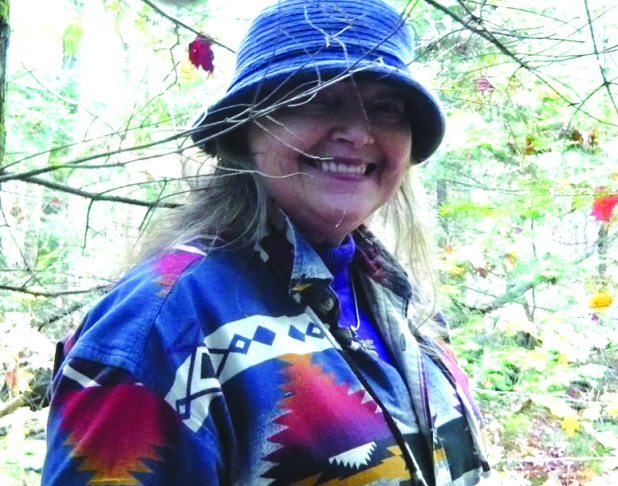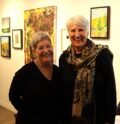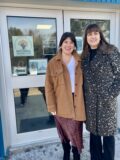Archive » Headline News » News
Real Food Heroes: The Wild Mushroom Lady
November 25, 2014

By Nate Smelle
In this third and final article of the series regarding the winners of the real world food prize awards in North Hastings for 2014, Bancroft This Week discusses why sustainable food is important to the Wild Mushroom Lady Lin Timbers.
Timbers passion for wild mushrooms began when she was a child, remembering when she and her parents would venture out into the forest in search of their most treasured food prize. She fondly remembers shouting excitedly when she found one to alert the others on these family morel picking picnics in the forest.
“I got hooked on picking wild mushrooms when I was 6 years-old,” said Timbers.
“I love mushrooms! How they look and smell, their delicious flavours, plus the excitement and wonder of finding them while wandering in the magical woods. I love to learn. The more I learn about wild mushrooms, and other wild edibles, the more I find there is to learn.”
When she found out that she would be receiving the Real Food Heroes award, Timbers said she was both surprised and honoured.
“I’ve met some wonderful people through the organic gardening workshops given by Laurie Ann Storing, of the Madawaska House Retreat and Organic Gardens, and completely agree with the real food objective of strengthening the land to create true food security, and to move away from corporate control, GMOs, toxic chemicals, patented seeds and other frankenfood horrors.”
Making these wild edibles even more enticing are the many health benefits that come along with many of the species of mushrooms growing in this part of the world. With high food prices and low wages the status quo in North Hastings, Timbers said it is especially important for people to understand the potential for free and healthy organic food right under their feet.
“Foraging for wild mushrooms makes one hyper-observant of nature – aware of cycles, seasons and weather patterns,” said Timbers.
“As someone who is chemically sensitive, collecting wild mushrooms has been my ticket to recovering health. Wandering in the woods, breathing fresh air, is the perfect antidote against the chemical pollution and petrochemical scent contamination which is everywhere these days. To maintain this purity, I require all workshop and hike participants to be scent free, including scented cleaning products or bug sprays.”
Mushrooms and fungus possess many other qualities that are beneficial to the ecosystems where they grow. For instance, certain species of polypore mushrooms have recently been discovered as crucial to the health of bees; which in turn, is beneficial to the health of the human food supply.
“Fungus are essential to life,” said Timbers, “they are the ultimate recyclers.”
“Without mushrooms and their mycelium [the root-like network of filaments below the ground from which the mushrooms fruit] to break down leaves, wood and even minerals, the world would soon be inundated with dead vegetative matter.”
Mushrooms play a big part in forest ecosystems. Forming a symbiotic mycorrhizal relationship with tree roots, they help make minerals and moisture available to the trees receiving sugars created by photosynthesis from the tree’s roots. This relationship is beneficial to garden plants as well, according to Timbers. Without the right fungi in the soil many seeds would fail to germinate, she explained.
“The agri-industrial-complex has poisoned so much prime farm land that it is unconscionable,” Timbers said.
“The only solution is to grow organically. Feed the soil and you feed the people. Poisons do not belong in food production. Kill the ‘weeds’ and fungus and you kill the soil and the life in the soil. Dandelions are not the enemy – they could heal your alcohol-damaged liver and save your life! Eat your weeds – with a side of delicious wild mushrooms, of course. In my opinion, poisoning farmland is a crime against humanity. the planet needs to be respected, it needs the gentle balance to be maintained and not strained.”
Last year Timbers taught five workshops on wild edible mushrooms in conjunction with Ang Moore, of Mystic Hollow farm off of Lower Faraday Rd. In these workshops, Timbers emphasizes finding the most gourmet mushrooms, rather than trying to identify every mushroom the group finds. Although many mushrooms throughout North Hastings are not poisonous, it is good to learn the ones that are most tasty first, since many are too tough to eat. This helps save time for foragers looking for a meal.
“When I teach people about mushrooms, I first tell them about the most deadly ones to avoid – and some of the most deadly ones do grow here. The number one rule in picking wild mushrooms is: if in doubt – throw it out. I want people to have a really positive experience – a wonderful woods experience, easy exercise, and delicious goodies to take home.”
To be safe, Timbers advises her students learn about wild edibles slowly and thoroughly before heading out into the forests or fields to find a meal. This cautious approach towards collecting and eating wild mushrooms has worked well for her. In the more than 50 years she has been collecting she has not once accidentally poisoned herself or anyone else. The secret, she said, is to learn a few new species of edible mushrooms each year, along with a few new ones to avoid.
Timbers plans to host a series of workshops again in 2015. Her full-day workshops begin with a slide presentation and talk; followed by a group foraging hike and a potluck lunch including cooking and tasting some of the mornings finds. The afternoon session begins with another collecting hike so that participants can take home a container of delicious fresh wild mushrooms.
She sees these workshops as an opportunity to educate people about the many healing properties of mushrooms. Although the healing powers of mushrooms have been recognized by shaman and doctors for millennia, the modern-day medical community, who may have previously asked “what are medicinal mushrooms?”, is just now starting to pay serious attention to some of these ancient healing techniques. Timbers believes it is crucial that this knowledge is passed down to future generations. With less than 14,000 species that have been identified of the estimated 150,000 species of mushroom believed to exist worldwide, the full potential of wild mushrooms as a food source and as medicine is just now starting to be understood.
For more information on The Wild Mushroom Lady, or on Timbers’ workshops contact: [email protected], or phone 613-332-6297.

















